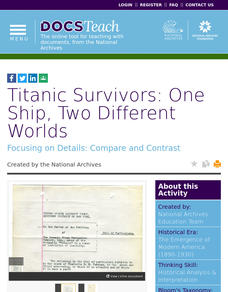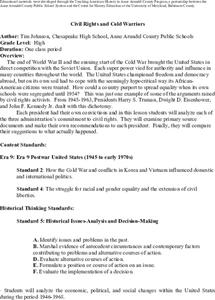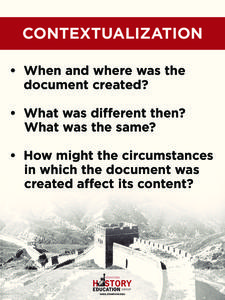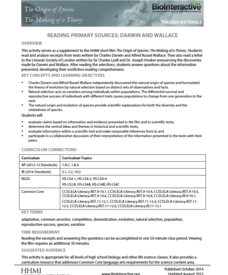DocsTeach
The Titanic Disaster: One Survivor's Story
An activity focuses on Lucy Ridsdale, a survivor of the sinking of the Titanic. Scholars analyze primary sources and place them in the correct sequence. Academics also complete a worksheet and participate in group discussion to...
DocsTeach
The Titanic Disaster: Measuring Loss of Life, Property and Injuries
One man's unsinkable dream became a disaster for many. An intriguing activity uses primary sources to examine the claims made by Titanic survivors against the White Star Line. Scholars analyze the claims, complete a worksheet, and...
DocsTeach
Titanic Survivors: One Ship, Two Different Worlds
Scholars explore claims from two Titanic survivors, a first-class passenger and a person from the steerage class. The activity uses primary documents to help pupils determine whether the White Star Line showed preferential treatment to...
Center for History Education
Civil Rights and Cold Warriors
Three presidents, three views on civil rights. Scholars compare the administrations of President Truman, Eisenhower, and Kennedy to understand how each addressed the issue of civil rights. The lesson uses primary sources and graphic...
US National Archives
Susan B. Anthony and the Struggle for Suffrage
Susan B. Anthony was willing to break the law to gain voting rights for women. Young historians investigate Anthony's willingness to go to jail to draw attention to the suffrage movement. They read and discuss primary source documents to...
National Endowment for the Humanities
Harriet Tubman and the Underground Railroad
While many have heard of Harriet Tubman, few are aware of the many ways this remarkable woman was involved in the United States Civil War, the abolitionist movement, and the Underground Railroad. Young historians examine primary source...
US National Archives
WWII: Western Europe 1939-45 – Resistance and SOE
Germany seemed to be unstoppable in the early years of World War II, but the tireless and sacrificial work of the Special Operations Executive (SOE) helped to steer the war in another direction. After exploring primary source documents,...
US National Archives
WWII: Western Europe 1939-45 – Hamburg
Was bombing German cities an effective means to an end, or was it a war crime? Could it be both? Young historians ponder these questions with an activity that prompts them to use primary sources to summarize the debate surrounding RAF...
US National Archives
Eastern Europe 1939-45 — Camps
Britain's decision not to bomb German death camps in World War II has provided many questions for historians, but with a primary source analysis lesson, high school students may be a step closer to finding out the truth. Learners read...
US National Archives
Eastern Europe 1939-45 — Stalingrad
Acts of civilian courage in Great Britain—and in one case, the island of Malta—often receive the George Cross, instituted by King George VI at the beginning of World War II. After the valiant defense of Stalingrad by its inhabitants,...
US National Archives
WWII: Western Europe 1939-45 – Invasion
Without the benefit of history, Western Europe in the 1940's had no idea what was about to befall them. Class members use primary sources, including political cartoons, videos, and internal documents, to analyze how much of a threat...
US National Archives
Eastern Europe 1939-45 — Berlin
The inevitability of World War II has arrived: Berlin has fallen. Young historians watch contemporaneous footage of the event, analyze primary source documents, and write a news report that details the roles of the Soviet, British,...
US National Archives
WWII: Asia 1939-45 – Burma
Because World War II encompassed most of the globe in one way or another, many pivotal battles and events are not as visible in the history books, leaving veterans of these conflicts feeling overlooked by more famous skirmishes. High...
Stanford University
Close Reading
Here's a poster that highlights the skills needed for the close reading of primary source documents when gathering evidence to support historical claims.
Stanford University
Corroboration
How do historians corroborate the information in a primary source document? They use the questions features on this poster!
National Endowment for the Humanities
Victory and the New Order in Europe
A New Order in Europe calls for a new lesson plan! This third plan in a series of four sequential lessons encourages high schoolers to read primary sources about the development of the New Order and follow up their knowledge with a...
K12 Reader
Summarize It: President Theodore Roosevelt's 7th Annual Message to Congress
How did Theodore Roosevelt stress the importance of conservation during his time as president of the United States? Take a closer look at the language Roosevelt used himself in a 1907 address to Congress, and have your young historians...
Stanford University
Contextualization
Part of a series of posters designed to be used with a unit fostering the skills needed to read like a historian, this template models the questions researchers need to ask to contextualize a primary source document.
Polk Country Schools
The Death of Abraham Lincoln DBQ
The assassination of Abraham Lincoln was a pivotal moment in American history, but what were the immediate effects throughout the newly unified country? A document-based question focuses on the consequences of the first assassination of...
Albert Shanker Institute
Who Was Bayard Rustin?
Who was Bayard Rustin? Pupils analyze a series of primary source documents to learn about this important figure in the civil rights movement. The activity contains a short film to watch along with guiding questions and other resources...
Howard Hughes Medical Institute
Reading Primary Sources: Darwin and Wallace
Take your classes back in time. Learners read real historical texts from both Darwin and Wallace as well as an announcement of their findings. Using guiding questions, they make inferences and draw conclusions from the information in the...
New York State Education Department
Global History and Geography Examination: June 2015
Looking for a new writing prompt or primary source practice for your global history or geography class? Take a look at a helpful state standardized test for additional practice for your learners. Writing prompts include asking scholars...
National Constitution Center
Explore Rights Around the World
How has the American Bill of Rights influenced the rest of the world? An interactive web activity helps individuals see the similarities between countries' bills of rights. A text-to-text tool compares the American Bill of Rights to...
College Board
2017 AP® World History Free-Response Questions
Religion and politics have a complicated history. How were they intertwined with wealth in Europe and Asia in the Middle Ages? Learners explore the question using a prompt based on primary sources. Other activities allow individuals to...
Other popular searches
- Using Primary Sources
- Wwi, Primary Sources
- Rosa Parks Primary Documents
- Gilded Age Primary Sources
- Working With Primary Sources
- Primary Resources Hsie
- Web Quests Primary Sources
- Ancient Rome Primary Sources
- 1920 1929 Primary Sources
- Primary Sources and Family
- Conscription Primary Sources
- Scotland Primary Sources

























